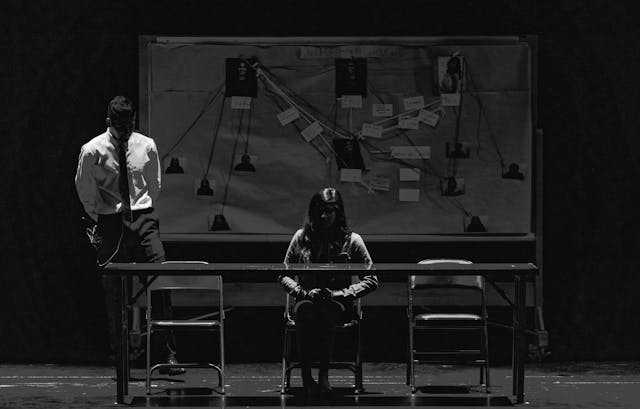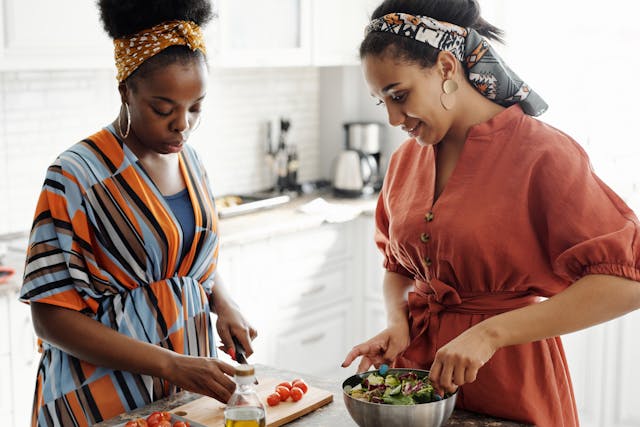Most victims of human trafficking are severely traumatised, and have neither papers nor perspectives. They are absolutely terrified, and require huge support in a range of areas. First and foremost, however, they need safe accommodation if they are ever going to be able to breathe easily again. But that is not always as easy as it should be.
“One of the women in our refuge comes from Nigeria. When she first arrived in Germany, pregnant, confused and crying, she ran into the arms of a former resident of our refuge, in the middle of Karlsruhe Hauptbahnhof station. She had just fled from the people who had originally lured her to Europe on false pretences and forced her into prostitution in Italy. She and her baby have since found a home at our refuge. […]”

The beginning of a report by Karlsruhe-based not-for-profit Verein The Justice Project e.V., which offers a variety of services supporting victims of human trafficking, sexualised exploitation and sexualised violence.
Connected to its “OASE consultation office” is an officially recognised refuge. Seven women and their children have been given secure accommodation there. The victims, the majority of whom come from Nigeria, are often discovered in refugee accommodation. As well as protection, they are offered support in their asylum process, trauma work, integration measures, relapse prevention, and above all recovery. The women stay for around one year before they can lead an independent life.
The right to safe accommodation

Those affected by human trafficking and exploitation have a right to safe and suitable accommodation. This is an important prerequisite for them to be able to recover and to stabilise, but above all to be able to feel safe. To do this, of course, the accommodation has to meet different criteria than homes for asylum seekers or the homeless.
Most victims reach secure accommodation via specialist consultation points such as those described here, the police or medical institutions. Although some of these consultation points maintain their own refuges, most of those affected are housed in women’s refuges or for a while in boarding houses, if this can be financed.
No victim’s rights without a victim statement
According to the Austrian Human Trafficking Task Force, victims have “a claim to support and care as soon as the authorities responsible have grounds to assume that they have been, or are still being, impacted by human trafficking. The right to support and care includes general care and psychosocial support, as well as the right to support during the psychosocial and legal process. […] The claim to support and care must not be made dependent upon whether the victim is prepared to cooperate in the criminal investigations, the criminal prosecution or the court process.”
Katharina Beclin, coordinator and speaker of the Austrian “Platform against Exploitation and Human Trafficking”, notes, however, that in order to access the fundamental victims’ rights under the European Council Convention, it is necessary to be officially identified as a victim. The problem with this is that in Austria, this victim position can only be carried out by the police, and requires a victim statement or criminal complaint.
“Since most victims – to begin with, at least – are not in a position to do this psychologically, many of them continue to be denied access to their rights based on international conventions. As if this were not enough, it is usually also linked to the question of the right to remain, which is itself a prerequisite for a work permit. Often, therefore, those affected would view bogus self-employment or prostitution as a last resort – worsening their situation further still.”
The situation in Germany is similar – in many German Federal States, the immigration authority demands a “confirmation of victimhood” by the police or public prosecutor’s office.
SOLWODI – Solidarity with Women in Distress – is an internationally active organisation which operates a refuge in Vienna. SOLWODI Österreich is dedicated to upholding the rights of women with a migration background who have had to experience human trafficking, forced prostitution or other forms of violence. The refuge in Vienna accepts women with children up to the age of seven, irrespective of their religion or citizenship.
“The women suffer from psychological consequences such as post–traumatic stress disorders, are scared, and have sleep disorders and depression”, says manager Anna Mayrhofer. As well as this, most of the women are also deeply fearful of making a victim statement against the perpetrators. The women are taken in, therefore, independently of whether they are collaborating with the authorities. They are referred by street workers, NGOs, the health authority and church-related organisations, amongst others.
A secure environment to stabilise and recover
In Austria, victims of human trafficking have thirty days’ “recovery and reflection time”, designed to enable them to recover from the events and consider how they should move on from there. During this time, they cannot be deported. The victims have their rights and possibilities explained to them, including process support, German language lessons, compensation and the fact that they can get a right to remain for at least one year. During this period, they receive basic social security services.
In Germany, the “reflection and stabilisation period” lasts at least three months, “irrespective of whether they have made a victim statement to the police or not.” It also gives the victims time to create distance between themselves, the perpetrators and the experience, to inform themselves about what possibilities are open to them, and then to decide whether they would like to make a victim statement against their perpetrator. During this time, they, too, cannot be deported, and receive social services.
But as already mentioned, the immigration authorities demand an official victim statement within exactly this recovery period if they are to retain precisely this right to a secure future.

Who bears the costs?
The system in Germany is not a singular one. The Federation prescribes the legal framework within which Federal States can act. Most of the Federal States receive money from the Federation and/or communes to accommodate those affected. Some have set up a fund from which short-term accommodation, in a boarding house, for example, can be financed. Usually, the money is not sufficient, and has to be increased through donations or own funds.
One widespread model is “daily rate financing”. In this case, victims themselves or the social services provider responsible have to bear the costs. If the victim or residential status is not legally clarified, though, this acceptance of the payments becomes problematic. Often, however, they are accepted by the refuges, which then try to cover the costs through donations.
Not enough space for everyone
If the refuge facilities are full, women and their children – for whom there are various age limits – are usually accommodated in women’s refuges. These, too, are often full. Sometimes, depending on the financial resources available, individual solutions can be sought.
In this case, however, there are even more victim groups affected by human trafficking, such as men, boys, families and trans-gender people. These represent a major challenge, which can usually only be handled to an unsatisfactory extent. Because even if food and accommodation can be provided, the traumatised victims need much more than that.
There is not a single accommodation for people of male gender who have been affected anywhere in Germany, for instance. These victims are usually accommodated in homes for refugees or the homeless, which fall far short of meeting the criteria for safe accommodation, of course.
In Austria, however, there is an organisation which looks after male victims. MEN VIA (https://men-center.at/arbeitsbereiche/men-via/) is an institution of the Viennese men’s health centre MEN. “The help provided by MEN VIA includes consultation, safe accommodation, support in legal, medical, psychological and social matters, and support in planning for the future.”
What could be improved?
“KAVOD, all-round help for people impacted by sexual exploitation”, is an Austrian association which focuses on forced prostitution and human trafficking. KAVOD tries to gain the trust of suspected victims through scouting social work amongst streetwalkers, in bordellos, brothels and clubs in Vienna and Styria. An emergency hotline manned around the clock means help can be offered at any time, whether this be medical or in the form of accommodation in a safe refuge environment.
Sabine Kallauch, managing director of the association, says many victims are not in a position to make a statement against their perpetrators due to emotional or social dependency, or a threat against them. Without a victim statement, though, you would not be acknowledged as a victim.
“As a platform [against human trafficking], therefore, we demand that victims of human trafficking are afforded their full victims’ rights, particularly the right to remain, basic provision or help in special life situations and access to the health system, irrespective of a criminal statement, if they are identified and cared for by a specialised NGO as a victim of human trafficking.”
This appears to be a wise approach, to save the victims delays to, or even denial of, their rights. Above all, though, it allows them to find peace again, without immediately having to present themselves before the authorities, and without having to submit the dreaded victim statement.
And irrespective of this, a safe “place for all” must be created – no matter what their age, gender or what donations have been made.
Translated by Tim Lywood
#Schutzhaus #Schutzhäuser #Menschenhandel #Zwangsprostitution #Frauenhäuser #PlattformgegenMenschenhandel #Schutzeinrichtungen #Ausbeutung #Menschenrechtskonvention #SichereUnterkunft #SexuelleAusbeutung #Arbeitsausbeutung #Männerhaus #Männerhäuser #AgainstHumanTrafficking #GegenMenschenhandel #EndExploitation #EndTrafficking #HopeForTheFuture #Österreich
